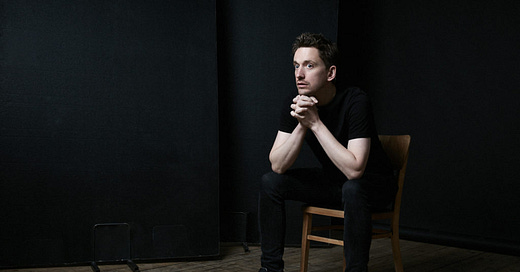When I first embarked on my career change, with the aim of writing my first book, my wife sent me a very kind gift in the form of a video message from one of my favourite comedians: John Robins.
Its contents only cemented my fondness for the man and, ridiculous as it may seem, acted as strong encouragement to roll my sleeves up and get on with things.
He’s had an interesting time of things recently, and has just been on the telly, so now seemed as good a time as any to offer up a few words of tribute.
—
Even though it has now finished and the winner declared, the complex modern rules and etiquette regarding spoilers prevent me from saying who has ultimately won Series 17 of Taskmaster.
Winning isn’t necessarily the point of the show, either, but I’ve been rooting for John Robins all along: not just because I’m a big fan of his, but also because I know how seriously he’s been taking it. As long-time radio partner Elis James might put it, ‘John needs this.’
It’s been a long journey to this point, despite repeated assertions over the years from those on ‘the internet’ that Robins’ friendship with Taskmaster creator and on-screen assistant Alex Horne made him a shoo-in for a place on the show.
For the man himself, this speculation no doubt served only to rub salt into the wound of his repeated non-selection, a reference to which made it into a memorable segment of his 2023 stand-up set, Howl, as one of the many sticks his brain would use to beat itself up with.
It doesn’t take an error in judgement as significant as reading a Reddit thread about the current series to realise that Robins may not necessarily be a household name (although, as ever, it’s best to take the protestations of those original thinkers who claim not to have heard of even the most high-profile of comedians with a pinch of salt). But he certainly deserves to be.
In his regular radio and podcast appearances with Welshman James, the line between truth and exaggeration when it comes to Robins’ oft-expressed career frustrations has probably nudged gradually towards the latter over the years. For fans and Robins apologists, though, the fact that his capture of the coveted Edinburgh Comedy Award in 2017 led only to a short-lived internet-based quiz show on digital channel Dave and a recording of the winning stand-up set, The Darkness of Robins, emerging unannounced to all — including the writer and performer himself — on Netflix some three years later (and then swiftly disappearing again1) seemed to be a decent representation of the mysteries and machinations of the comedy industry.
What has endured throughout is a ten-year radio and podcasting partnership - a digital decade - with James. It ran for five years on XFM (later Radio X) — their back and forth sandwiched, as required on commercial indie radio, between promotions for Strongbow Dark Fruits and the heavy rotation of songs that men in their 40s who like football might call ‘proper music’ — before transferring to the BBC, where their presence on the Friday afternoon schedule on 5 Live incurred the wrath of some regulars expecting, and demanding, their regular dose of hard-hitting news and sport.
Most recently, the show has moved to a podcast first format, which transcends the linear thinking of traditional radio listeners (and is thus no longer subject to any ALL CAPS messages of derision). Still, while the stereotypical 5 Live punter may not necessarily be among them, Elis and John have nevertheless cultivated and maintained a loyal and dedicated band of followers across all stations and formats, known as Podcast Devotees (or PCDs for short).
Outside of the traditional show’s double-act dynamic, which casts him as a slightly brittle egomaniac, Robins is adept in an interview situation, as either the guest or host: after multiple appearances on Richard Herring’s Leicester Square Theatre Podcast (RHLSTP!) he was put in charge of Episode 300, when the traditional roles were reversed and Herring was a guest on his own show.
Meanwhile, the sister podcast of his BBC programme with Elis, How Do You Cope?, is that rarest of things: a male-fronted discussion on topics related to mental health that is neither self-serving nor claims expertise based solely on the hosts’ experiences.
However, last year Robins had to confront his own demons (to use a dreadful cliché), when he realised that his relationship with alcohol had become an issue that needed to be addressed. The tradition of a comic persona as a logical extension of reality notwithstanding, there was in retrospect a suspicion that something darker might lie behind the entreaties to ‘Keep It Session’2 and the descriptions of periods on the booze and off the booze; of heavy nights and early nights.
Still, the possibility (and hope) remained that it was all a bit of a laugh and a joke, until that slightly heart-breaking moment when, at the beginning of Al Murray’s episode of The Moon Under Water (John’s podcast with best friend Robin Allender in which a guest’s ideal ‘Pub of the Mind’ is discussed), Murray’s well-meaning praise for the host as an enthusiastic and unapologetic celebrator of pubs and alcohol brought a response that suggested this would no longer be the case.
The keys to the virtual pub were soon handed over to a new landlord, and shortly afterwards, John was talking with typical (and ultimately award-winning) eloquence on a new episode of How Do You Cope? about his decision to stop drinking and seek help.
That revelation came at a time when I was in the process of belatedly attempting to achieve ‘Retro-Oner’ status, afforded to those PCDs who may not have listened to every episode of the Elis James and John Robins show at the time, but have since gone back to 2014 in order to acquaint themselves with the digital decade in full.
It felt slightly strange listening to the hi-jinks of the duo’s younger and more carefree years with the knowledge of what was to come, although — as Robins later admitted on Rich Wilson’s podcast Insane In The Men Brain — there was something in the slightly manic energy provided by being a little bit hungover on the radio that contributed to the overall vibe, and perhaps even the success, of the Elis and John show.
That same energy, and the Robins of old, might well have been an entertaining presence on Taskmaster — pedantic, angry at himself, and short-tempered with others, as in the podcast’s long-running Made Up Games feature — but if the 2024 incarnation has been a slightly more subdued one, that’s only to be expected.
While the suspicion remains that some comic performers too readily embrace any kind of personal crisis as a great opportunity for new material, nothing about the last year or so has seemed like anything other than a real man going through real problems while continuing to do his job as an entertainer.
If all of this sounds vaguely paternal — even though John and I are roughly the same age, and I’m in absolutely no position to offer advice to anyone in the public eye — it’s because of the sense of authenticity that permeates his work and suggests to his audience that they are, at least some of the time, hearing from the real person.
It’s impossible, of course, to say for certain whether this is actually the case; the modern world of social media and podcasts has the ability to create parasocial relationships like never before, and the attendant pressure on performers seems like enough to overwhelm even the hardiest of personalities, even if it mainly comes in the seemingly benevolent form of a steady stream of correspondence3 detailing how their work has helped someone through a difficult time, and the occasional gift.
(When I saw Robins perform Howl, a woman in the audience interrupted the show and attempted to engage the comedian in a one-to-one conversation based on the fact she was a ‘Retro-Oner’. ‘I think you’re in danger of misunderstanding how a stand-up comedy set normally works’, was his reply).
If anyone does overstep the mark slightly, both Elis and John are likely to be understanding: a recurring theme on the podcast is the concept of ‘getting it wrong’ when presented with an opportunity to interact with one of their own heroes. Meanwhile, John’s Shame Well, a long-running series of listener-submitted tales of embarrassment, of the kind that might suddenly pop into your mind during a restless night or cause you to linger over the washing up while shaking your head at yourself, despite the incident having happened years ago and likely been forgotten about by everyone else, is also representative of their brand.
I nevertheless found myself worrying about ‘getting it wrong’ when I received the gift of a personalised message from Johnny JR himself via Cameo, despite fully understanding the nature of this service: that this was a static video recording made in the past in exchange for money with no interaction involved.
(Robins is, as the reviews suggest, excellent value on Cameo, and the thoughtful 3 minute video he provided was in sharp contrast to the one a family member received from a 90s footballer, whose brief message of birthday congratulation swiftly took a segue into a bleak and sweary tale of historic self-destruction and ended shortly afterwards).
‘I long ago gave up trying to write what I thought people wanted to hear,’ said Robins in an interview with the Guardian last year. ‘Or to be what I thought a comedian was. What you then end up with is an inauthentic performance. If I see you as a comic, I want to know who you are.’
Just as it does in his other work, that has come through in Taskmaster. One of the show’s great strengths is that it gives contestants time and space to express themselves as performers (although, ironically, its difference from traditional panel shows, with their scripted jokes, competitive atmospheres, and rotating casts of comedians between episodes, was apparently once perceived as a stumbling block).
It has been a good series, and John has been good in it. While there are many different ways to play the game, anything other than his preferred method — win by being the best and doing the best — wouldn’t really have been appropriate (or, one suspects, even possible).
Here’s hoping John’s appearance on the show has won him a few more fans — and maybe even some future good fortune when it comes to those mysterious forces of the entertainment industry. Godspeed, You! Johnny JR.
Beat The Internet With John Robins, however, remains available via UKTV Play.
To quote from the Elis and John book, The Holy Vible: “the practice of drinking ale, lager or cider, equal to, or below, 4.5% ABV” on the basis that doing so allows the drinker “to drink more, and for longer.”
Are you on email? You simply have to be these days.





